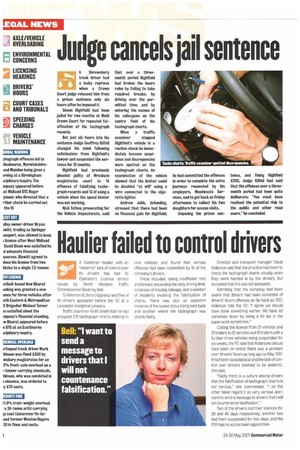Judge cancels jail sentence
Page 16

If you've noticed an error in this article please click here to report it so we can fix it.
A Shrewsbury truck driver had a lucky reprieve when a Crown Court judge released him from a prison sentence only six hours after he imposed it.
Simon Highfield had been jailed for two months at Mold Crown Court for repeated falsification of his tachograph records.
But just six hours into his sentence Judge Geoffrey Kilfoil changed his mind following submissions from Highfield's lawyer and suspended the sentence for 12 months.
Highfield had previously pleaded guilty at Wrexham magistrates court to 14 offences of falsifying tachograph records and 13 of using a vehicle when the speed limiter was not working.
Nick Tatlow, prosecuting for the Vehicle Inspectorate, said that over a threemonth period Highfield had broken the hours rules by failing to take required breaks; by driving over the permitted time; and by entering the names of his colleagues on the centre field of his tachograph charts.
When a traffic examiner stopped Highfield's vehicle in a routine check he immediately became suspicious and discrepancies were spotted on the tachograph charts. An examination of the vehicle showed that the limiter could be disabled at will" using a wire connected to the cigarette lighter.
Andrew Jebb, defending, stressed that there had been no financial gain for Highfield; he had committed the offences in order to complete the extra journeys requested by his employers, Woodwaste Services, and to get back on Friday afternoons to collect his two daughters for access visits.
Imposing the prison sen
tence, and fining Highfield 2200, Judge Kilfoil had said that the offences over a threemonth period had been quite deliberate: "You must have realised the potential risk to the public and other road users," he concluded.




























































































































